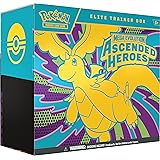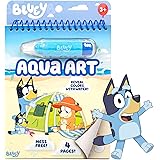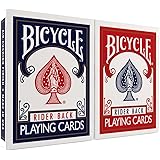The Art of Mindful Parenting
50+ Official Pokemon Cards Collection with 5 Foils in Any Combination and at Least 1 Rarity, GX, EX, FA, Tag Team, Or Secret Rare
$8.95 (as of February 26, 2026 08:40 GMT +00:00 - More infoProduct prices and availability are accurate as of the date/time indicated and are subject to change. Any price and availability information displayed on [relevant Amazon Site(s), as applicable] at the time of purchase will apply to the purchase of this product.)Pokémon TCG: Mega Evolution—Ascended Heroes Elite Trainer Box
$119.99 (as of February 26, 2026 08:40 GMT +00:00 - More infoProduct prices and availability are accurate as of the date/time indicated and are subject to change. Any price and availability information displayed on [relevant Amazon Site(s), as applicable] at the time of purchase will apply to the purchase of this product.)Play Doh Modeling Compound 10-Pack Case of Assorted Colors, Non-Toxic 2 oz. Cans, Back to School Gifts, Prizes, & Party Favors, Preschool Toys for Kids, Ages 2+ (Amazon Exclusive)
$7.99 (as of February 26, 2026 08:40 GMT +00:00 - More infoProduct prices and availability are accurate as of the date/time indicated and are subject to change. Any price and availability information displayed on [relevant Amazon Site(s), as applicable] at the time of purchase will apply to the purchase of this product.)This post may contain affiliate links which means I may receive a commission for purchases made through links at no extra cost to you. I only recommend products I truly believe in. Thank you for your support!
Being a parent is not about being perfect. It’s about being present and mindful. The Art of Mindful Parenting has changed how I connect with my kids. It has also made them happier and healthier.
In today’s world, it’s hard to stay focused. But conscious parenting teaches us to slow down. It’s about being present parenting and understanding our kids’ feelings and needs.
Key Takeaways
- Mindful parenting helps kids understand their feelings better.
- It makes family life calmer and more loving.
- It builds strong family bonds and secure attachments.
- It helps parents feel less stressed and anxious.
- It improves kids’ thinking, feeling, and social skills.
Understanding Mindful Parenting
Mindful parenting is a way to be more present and caring with our kids. It helps us understand ourselves better as we raise our children. We learn to accept our thoughts and feelings without judgment.
What Is Mindful Parenting?
Mindful parenting is more than just controlling our kids’ actions. It’s about knowing ourselves better as parents. By being mindful, we build self-worth and connect deeper with our kids. It keeps us calm, even when parenting gets tough.
The Benefits of Being a Mindful Parent
- Mitigating parental burnout and stress
- Improving self-compassion and emotional regulation
- Potentially decreasing children’s internal and external challenges
- Strengthening attentive parenting and responsive parenting
- Cultivating nurturing relationships with our children
Key Principles of Mindful Parenting
- Observing our thoughts, feelings, and behaviors with non-judgment and acceptance
- Creating micro-pauses throughout the day to reconnect with our inner selves
- Embracing the present moment and finding joy in the small, everyday interactions with our children
“Mindful parenting is not about being perfect; it’s about being present, with compassion, for ourselves and our children.”
By living these principles, we can change how we parent. We can make our relationships with our kids stronger and more loving.
My Journey to Mindful Parenting
My journey to mindful parenting started a few years ago. I learned about Positive Discipline and Emotional Intelligence in Childhood Development. I found that being present, aware, and empathetic is key to good parenting.
How I Discovered Mindfulness
I started my mindful parenting journey at a workshop. It was about being present with my kids. Mindfulness helps parents avoid burnout and be kinder to themselves.
Challenges I Faced Along the Way
Being a mindful parent was tough. I often fell back into old ways, like reacting instead of responding. It took practice to stay calm and meet my kids’ needs.
It was hard to stop comparing myself to others and to let go of high expectations. But I kept working on it.
Transformative Moments in My Parenting
As I practiced mindfulness, my parenting changed a lot. One big moment was when I learned to watch my kids without jumping in. This helped me understand them better and respond with kindness.
Watching and understanding my kids has made our bond stronger. It’s helped me control my emotions better too.
“Mindfulness is a research-backed strategy shown to mitigate burnout and improve self-compassion.”
My journey to mindful parenting has been tough but rewarding. By using Positive Discipline, Emotional Intelligence, and Childhood Development, I’ve become a better parent. Our family’s connection has grown stronger, and I’m excited to keep learning.
Practicing Presence with My Children
Being a parent means staying present with my kids. It’s hard with all the chaos and distractions. But, present parenting is key for attentive parenting and nurturing relationships.
Techniques for Staying Present
To be present, I use mindfulness. I observe without judging and take short breaks. These help me stay focused, even when things get busy.
Activities That Encourage Mindfulness
- Joint meditation sessions, where we sit together and focus on our breath
- Nature walks, where we observe the sights, sounds, and sensations around us
- Quiet playtime, where I resist the urge to interrupt and instead, watch my children’s imagination unfold
The Impact of Presence on Family Bonding
Being present with my kids has a big impact. Research shows that mindful parenting leads to more calmness, less stress, and a more enjoyable parenting experience. It makes our family bond stronger and our kids thrive.
“Parenting does not work well under stressful, rushed, and distracted conditions. Changing family culture to embrace mindful parenting requires a long, sustained effort in a new direction, starting small and building up over time.”
I’m on a journey to be more present with my kids. By focusing on this, I aim to build strong, nurturing relationships. This will help shape their growth and leave a lasting legacy of attentive parenting.
Emotional Awareness in Parenting
Being a mindful parent has shown me how key emotional awareness is. Emotional Intelligence, Responsive Parenting, and Nurturing Relationships are my main tools. They help me create a supportive space for my kids to grow.
Recognizing My Emotions
First, I learned to understand my own feelings. Through daily reflection and mindfulness, I get to know myself better. This self-awareness helps me manage my reactions and meet my kids’ needs better.
Teaching My Children About Feelings
I also focus on teaching my kids about their feelings. We talk openly, use stories, and role-play to learn about emotions. This way, they learn to understand and share their feelings.
Practicing Empathy and Understanding
Empathy and understanding are at the core of my parenting. I listen to my kids, validate their feelings, and offer a safe space to share. This has made our bond stronger and helped us face challenges together.
By using Emotional Intelligence, Responsive Parenting, and Nurturing Relationships, I’ve seen big changes. It’s a journey of self-discovery and joy. Seeing my kids grow into emotionally strong and caring people is amazing.
Balancing Discipline and Mindfulness
Parenting is a delicate balance. It’s about discipline and mindfulness. As a mindful parent, I’ve found that discipline and calm can go together. This makes for a more effective and caring way of parenting.
The Role of Mindfulness in Discipline
Mindfulness helps me think before I act. It keeps me in the moment. This way, I can understand what my child needs and feel.
It lets me help them in a kind way. This way, they learn and grow.
Positive Discipline Strategies
- Focusing on teaching and guiding, rather than punishing
- Using natural and logical consequences to help children learn accountability
- Setting clear expectations and enforcing rules with compassion
- Incorporating mindfulness practices into daily routines and rituals
Reflecting on My Reactions
Mindfulness also helps me think about my own feelings. I watch my thoughts and feelings without judging. This helps me understand myself better.
It makes me a better role model. It helps our family be more harmonious.
“Discipline without mindfulness can be harsh and ineffective, but mindfulness without discipline can lead to a lack of structure and boundaries. The key is to find the right balance.”
By mixing mindfulness into my discipline, I’ve seen big changes. Positive Discipline, Conscious Parenting, and Responsive Parenting have made a big difference. Our family is now stronger, more understanding, and full of respect.
Creating a Mindful Home Environment
Making a peaceful household and nurturing relationships is key in mindful parenting. We can design spaces that support conscious parenting. This helps create a place for presence, emotional awareness, and strong family bonds.
Designing Spaces for Mindfulness
Setting up areas for mindfulness in the home can deeply affect family life. You might have a cozy spot for quiet, a meditation area, or a play zone with a mindfulness theme. Using calming colors, natural things, and soft decor can make the home peaceful. It invites everyone to slow down and be present.
Incorporating Mindful Practices in Daily Life
Adding mindfulness to our daily life can make conscious parenting a part of our home. Starting the day with a family meditation or sharing thanks during meals is a good start. Doing mindful breathing and activities all day keeps everyone connected and calm.
Involving My Family in Mindful Activities
Building a nurturing relationship with our kids means doing things together. Doing yoga, going on mindful walks, or making art together helps us feel connected. These activities strengthen our family ties and teach conscious parenting values.
| Mindful Household Practices | Benefits |
|---|---|
|
|
“When we create a mindful home environment, we nurture the seeds of presence, compassion, and connection that will continue to blossom throughout our children’s lives.”
Effective Communication with My Kids
Being a mindful parent has shown me how important talking and listening are. Communication is key to our relationship. Using Attentive Parenting and Responsive Parenting helps us grow closer.
The Importance of Open Dialogue
Trust and honesty are vital for a strong bond with my kids. I work hard to make our talks open and safe. This way, they can share their feelings without worry.
By listening well and showing I care, we build a strong connection. This connection is based on understanding and respect.
Mindful Listening Techniques
- I focus fully on my kids when they talk. I don’t interrupt or rush to answer.
- I ask questions that help them share more. This lets them open up fully.
- I watch their body language and tone. This helps me understand their feelings better.
Navigating Difficult Conversations
Sometimes, talks can get tough or emotional. In these times, I try to stay calm and present. I manage my feelings with mindfulness.
I listen with empathy and help find solutions. This teaches my kids how to handle tough situations.
Good communication is the foundation of our Nurturing Relationships. By following Attentive Parenting and Responsive Parenting, we create a safe space. This makes our bond stronger and our family closer.
Self-Care for Mindful Parents
As a conscious parent, taking care of myself is key. It’s about being fully present with my kids and taking care of my feelings too. Self-care helps me stay energized, patient, and emotionally smart to be the best parent I can be.
Prioritizing My Well-being
Parenting can make it hard to remember my own needs. But, I’ve learned that taking time for myself is not selfish. It’s essential. Whether it’s meditation, yoga, or a spa day, taking care of my health makes me a better parent.
Mindfulness Practices for Myself
- Using mindful breathing like the “Infinity Symbol Breathing” to calm down.
- Doing mindful art, like making a “Mindfulness Box,” to find peace.
- Writing in a gratitude journal to notice the small joys in life.
Building a Support Network
Mindful parenting is a journey, but it’s better with friends. Being part of a community of parents has been a big help. We share, get advice, and support each other through the ups and downs of parenting.
By focusing on my well-being, practicing mindfulness, and connecting with others, I’m a better parent. This creates a peaceful home and helps my kids grow emotionally. It’s a lasting gift of Conscious Parenting.
Involving Family Members in Mindfulness
Creating a mindful family is key for strong relationships and peaceful homes. By teaching my partner about mindful parenting, we can work together better. This strengthens our bond and helps our kids feel secure.
Teaching grandparents about mindfulness helps bridge gaps between generations. It brings us all closer, sharing the value of being present and caring. As we all practice mindfulness together, we build a legacy that will benefit our family for years to come.
Engaging My Partner in Mindful Parenting
Mindful parenting works best when both parents are on the same page. By practicing mindfulness together, we can show our kids what it means to be calm and caring. This way, we create a loving home where everyone can grow.
Teaching Grandparents About Mindfulness
Teaching our kids’ grandparents about mindfulness helps us all understand each other better. It teaches them about being in the moment, controlling emotions, and talking with kindness. This brings our family closer and makes our parenting style clearer.
Creating a Mindful Family Legacy
By making mindfulness a part of our family life, we leave a positive mark on future generations. We can do this by making mindfulness a daily part of our lives. This way, we teach our kids the importance of self-care and emotional smarts, helping them grow into caring and strong adults.
| Mindfulness Practice | Benefits for Families |
|---|---|
| Meditation | Reduces stress, improves focus, and fosters emotional awareness |
| Yoga | Enhances physical well-being, promotes relaxation, and encourages mindful movement |
| Nature Walks | Connects families with the natural world, reduces anxiety, and encourages present-moment awareness |
“Mindfulness is not just about finding inner peace; it’s about creating a harmonious and supportive environment for our family to thrive.” – Jane Doe, Mindful Parenting Expert
Overcoming Mindless Parenting Traps
As parents, we often fall into mindless parenting. This means we act without thinking, compare ourselves to others, and follow what society expects. But, by focusing on Conscious Parenting, Present Parenting, and Emotional Intelligence, we can avoid these traps. This way, we can raise our kids in a more mindful way.
Identifying Common Pitfalls
One big challenge in mindful parenting is falling into habits. Operating on autopilot can make us react without thinking about the future. Also, comparing ourselves to other parents can make us doubt ourselves. Lastly, following societal expectations can make us lose touch with our kids and their needs.
Strategies for Staying Mindful
- Regularly check in with ourselves to assess our emotional state and level of presence.
- Set reminders to pause and be fully present with our children, even if it’s just for a few minutes during the day.
- Practice self-compassion, acknowledging that parenting is a constant learning process, and we’re all works in progress.
Reflecting on My Growth
It’s key to reflect on our progress in mindful parenting. Celebrating small wins helps us feel grateful and strong. This empowers us to keep going on our journey of Conscious Parenting, Present Parenting, and Emotional Intelligence.
| Common Mindless Parenting Traps | Strategies for Staying Mindful |
|---|---|
| Operating on autopilot | Regular check-ins |
| Comparing ourselves to other parents | Setting reminders for presence |
| Getting caught up in societal expectations | Practicing self-compassion |
By using these strategies and reflecting on our growth, we can beat the common traps of mindless parenting. This way, we can raise our kids in a more Conscious, Present, and Emotionally Intelligent way.
“The greatest gift we can give our children is our own wholeness.” – Tara Brach
The Role of Mindfulness in Education
Mindfulness in education helps kids learn by being present and paying attention without judgment. It teaches them to focus, manage emotions, and handle stress. Mindful education has deep, lasting benefits.
Supporting My Child’s Learning Mindfully
I try to be present and caring in my child’s education. Simple acts like listening mindfully during homework or breathing together before tests help a lot. This way, I support my child in facing school challenges.
Encouraging Mindfulness in School
I push for mindfulness programs in my child’s school. Studies show 98% of kids benefit, feeling better emotionally and socially. Mindfulness in class helps kids succeed in school and with friends.
The Long-term Benefits of Mindful Education
Mindful education’s long-term effects are amazing. Over 55% of kids say mindfulness makes life better, showing more joy and happiness. It also helps parents relax and feel more positive. Mindfulness builds a strong foundation for kids’ future success and happiness.
“Mindfulness allows parents to deepen bonds with their children and help children embody peace and joy.”
Celebrating Progress in Mindful Parenting
I’m grateful for the progress I’ve made in conscious parenting. Seeing my achievements motivates me to keep improving. It helps me grow in mindful parenting.
Recognizing My Achievements
I’ve changed how I parent through presence and emotional awareness. Old patterns of reacting have turned into thoughtful actions. Now, I handle tough situations better and with more empathy.
My connection with my kids has grown stronger. We have meaningful talks that show Conscious Parenting and Present Parenting in action.
Setting Goals for Future Mindful Parenting
I’m excited to keep learning about Nurturing Relationships in my family. I want to improve my meditation and emotional control. I also aim to find more mindful activities to bring us closer.
I’m dedicated to creating a space where we all can grow. Guided by mindful parenting, we’ll thrive together.
Sharing My Journey with Others
Mindful parenting has changed my family and inspired me to share my story. I talk about the ups and downs to encourage other parents. I hope to build a community of parents who care deeply about their kids.

















